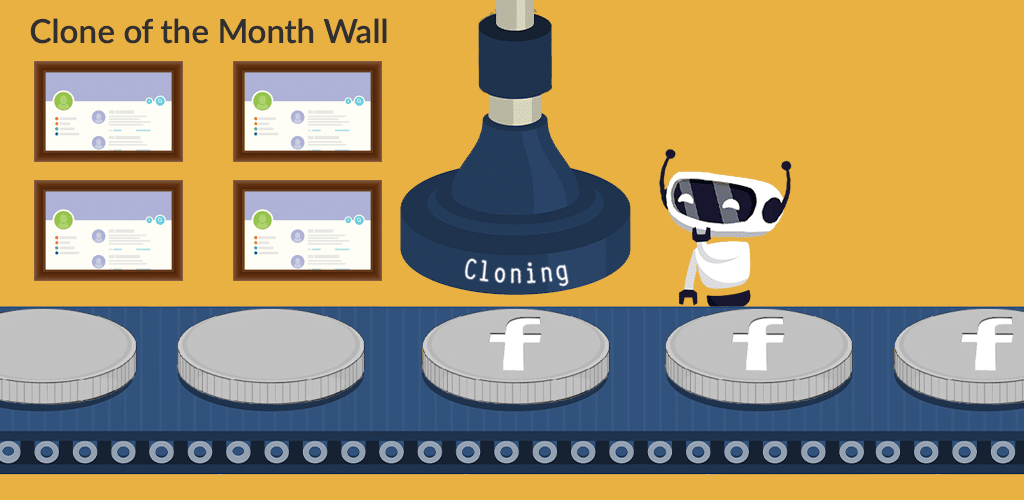March 10, 2020
Privacy Tip of the Week: Look Out For Facebook Cloning
Posted by Rhiannon

Facebook has more than 2.3 billion active monthly users. Of all the accounts associated with those users, a portion of them are clones. Facebook cloning occurs when another user makes a copy of your account. They take publicly available info, such as your name and photos, and recreate it. Although cloning is not the same as hacking, it can still pose consequences for you and your friends. Take a look at the uses of cloning and how you can prevent it:
- Uses of cloned accounts
- How to tell if your account has been cloned
- What to do about it
- How to prevent cloning
Uses of Cloned Accounts
Most people believe the greatest danger to Facebook users is hackers. However, account cloning by scammers can also cause many a headache. By creating an almost identical account to yours, scammers can add your friends. They can also pose as you for professional reasons. Common uses for Facebook cloning include:
- Sending Malicious Links to Friends and Family: This increases the spread of viruses and malware.
- Asking Your Friends for Personal Information: This info can make the cloned account look even more real. In addition, some personal information enables scammers to hack other accounts.
- Requesting Money From Friends: Your friends might be more inclined to give it, believing that your account is real.
- Posing as You to Harm Your Reputation: They may share inappropriate posts on your newsfeed or with your friends, family, and co-workers.
- Attempting to Shut Down Your Real Profile: A scammer may try to report your real account by pretending it is the cloned account.
How to Tell if Your Account Has Been Cloned
Unlike hacking, it’s reasonably easy to tell if your account has been cloned. It isn’t often a secret. In general, there are two ways a person finds out they have a clone account:
- One of Your Facebook Friends Reaches Out to Tell You: Most of the time, scammers who engage in Facebook cloning will try to add your existing friends to their account. If a friend becomes suspicious, they may shoot you a message to ask if the new account is real or not.
- You Search Your Own Name: Rather than relying on others to point out a problem, periodically search for your own name on the social media platform. If you see an account with the same name, photos, and basic info as you, you’ve fallen victim to cloning.
What to Do About Facebook Cloning
Unfortunately, because you don’t have direct access to a cloned account, you also can’t directly remove the account. However, there are ways to mitigate the effects of cloning.
- Report the Account: Facebook has tools to report accounts pretending to be someone else. If they verify the report as true, they can delete the fake account.
- Tell Your Facebook Friends: Make a public post and message your closest contacts. Let them know that someone has cloned your account and to ignore all friend or message requests from the fake one.
- Ask Your Friends to Report the Account: If multiple people are reporting a cloned account as fake, it may speed up the process of removing it from the platform.
In addition, you may also get requests from clones of your friends’ accounts. If this happens, reach out to confirm whether or not the request is a fake. If it is, do not engage with the account. Simply report it instead.
How to Prevent Cloning
Unfortunately, nothing you do on Facebook can fully remove the risk of cloning. The only fool-proof method would be to get rid of Facebook entirely, which isn’t an option for most. However, there are a few ways to reduce the risk.
- Increase Privacy Settings: If you have lax settings, you may be allowing scammers to see too much of your profile, such as photos, statuses, etc. This allows them to recreate a more realistic profile. By increasing your privacy settings, you reduce the information they can copy.
- Hide Your Friends: One of the biggest risks of Facebook cloning is that it attacks your friends. However, by hiding your friends list, you prevent the scammer from being able to make vulnerable connections with them.
Unfortunately, Facebook cloning isn’t the only risk that comes with using the platform. Hacks may also occur. In addition, Facebook is notorious for privacy violations and leaks. If you’re thinking about pulling the plug on the platform altogether, check out these tips.
Posted by Rhiannon
More Blog Posts
February 14, 2023
How the Investigatory Powers Act Impacts Citizen Privacy
In 2016, the United Kingdom passed the Investigatory Powers Act or IP Act, into law. This act empowered the government and related agencies to access and collect citizen data, without consent. Critics immediately slammed the new law. The media dubbed it the “Snoopers’ Charter.” Meanwhile, Edward Snowden described the act as “the most extreme surveillance […] Read moreFebruary 14, 2023
How to Easily Unblock Wikipedia with HotBot VPN
Wikipedia puts a wealth of information at your fingertips. Everything from the biography of Alexander Graham Bell to the basics of quantum computing can be instantly opened by curious browsers. But what happens when you can’t access that information? Whether a business network blocks it or a particular country censors it, don’t let that slow […] Read moreFebruary 14, 2023

